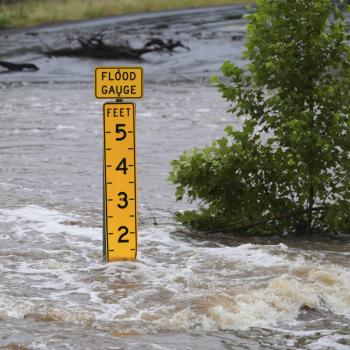 It’s not often that I connect the Sunday lectionary with my observations here. But The parable of tares, or weeds (Mt 13:24-30, 35-43) offers wisdom for the circumstances we face today. For reference, here is the text:
It’s not often that I connect the Sunday lectionary with my observations here. But The parable of tares, or weeds (Mt 13:24-30, 35-43) offers wisdom for the circumstances we face today. For reference, here is the text:
The Parable of the Weeds
24 He put another parable before them, saying, “The kingdom of heaven may be compared to a man who sowed good seed in his field, 25 but while his men were sleeping, his enemy came and sowed weeds[a] among the wheat and went away. 26 So when the plants came up and bore grain, then the weeds appeared also. 27 And the servants[b] of the master of the house came and said to him, ‘Master, did you not sow good seed in your field? How then does it have weeds?’ 28 He said to them, ‘An enemy has done this.’ So the servants said to him, ‘Then do you want us to go and gather them?’ 29 But he said, ‘No, lest in gathering the weeds you root up the wheat along with them. 30 Let both grow together until the harvest, and at harvest time I will tell the reapers, “Gather the weeds first and bind them in bundles to be burned, but gather the wheat into my barn.”’”
The Parable of the Weeds Explained
36 Then he left the crowds and went into the house. And his disciples came to him, saying, “Explain to us the parable of the weeds of the field.” 37 He answered, “The one who sows the good seed is the Son of Man. 38 The field is the world, and the good seed is the sons of the kingdom. The weeds are the sons of the evil one, 39 and the enemy who sowed them is the devil. The harvest is the end of the age, and the reapers are angels. 40 Just as the weeds are gathered and burned with fire, so will it be at the end of the age. 41 The Son of Man will send his angels, and they will gather out of his kingdom all causes of sin and all law-breakers, 42 and throw them into the fiery furnace. In that place there will be weeping and gnashing of teeth. 43 Then the righteous will shine like the sun in the kingdom of their Father. He who has ears, let him hear. (ESV)
The Gospel is a difficult one, but we have heard it so often, that I think the impact of it is all but lost on us. A paraphrase may help us to hear it anew:
Jesus put before the crowd another not-so-thinly-veiled-parable: “The kingdom of heaven may be compared to someone who sowed good people in his field; but while everybody was asleep, an enemy came and sowed bad people among the good people, and then went away. So when the people grew up and it became clear what kind of people they were, then the bad people appeared as well. And the slaves of the householder came and said to him, ‘Master, did you not sow good people in your field? Where, then, did these bad people come from?’ He answered, ‘An enemy has done this.’ The slaves said to him, ‘Then do you want us to go and gather up the bad people?’ But he replied, ‘No; for in gathering the bad people up you would uproot the good people along with them. Let both of them grow together until the harvest; and at harvest time I will tell the reapers, Collect the bad people first and bind them in bundles to be burned, but gather the good people into my barn.’”
Jesus didn’t pull his punches here, so, let’s not evade the challenge of this parable. The following truths become immediately apparent:
- We aren’t talking about farming.
- We are talking about the state of the world.
- We aren’t talking about wheat and weeds.
- We are talking about people.
- Specifically, we are talking about people who are good (which Jesus understands as those who hear and do the will of God).
- And people who are bad (which Jesus understands as those who refuse to hear and do the will of God).
- We are also talking about mystified disciples, who are a stand-in for you and for me.
- They are surprised by the presence of evil in the world. We often are as well.
- They would like to fix it – now, if not, then next week. And so would we.
- And they want to know if Jesus would authorize them to do the weeding.
Jesus is also pretty clear:
- The presence of those who refuse to do and hear the will of God is the work of “the enemy.”
- And, no, he isn’t going to give his disciples (and, by extension, you and me) permission to do the weeding.
- That could do unforeseen damage. Weeding is God’s job and God will do it.
- Effectively, Jesus tells them, “Keep planting, I’ve got this.”
As tough and uncompromising as this parable is, it is also really helpful, if we sit with its lessons – especially, if we are looking for spiritual direction in tough times. So, I would like to highlight a series of insights that I think that this story offers.
One, don’t be discouraged, there are always weeds.
So far, 2020 has offered up its share of weeds. There has been a lot to cope with: a pandemic that has taken lives around the world and threatened others; a global, economic shut-down that has threatened the livelihood and security of millions; racial tensions around the globe have surfaced in new ways; and, if we look beyond our own national borders there are still other challenges. Christians are being martyred in Nigeria; the independence of Hong Kong is threatened by China; the relationship between North and South Korea has deteriorated – and those are just a few of the problems that we face.
When events of this kind occur, and they disrupt our lives, the natural response is disillusionment. We tell ourselves: “This isn’t the way things are meant to be.” “How can these things happen?” “I thought that we were making such good progress.” “I thought the arc of history bends toward justice.”
There is a lot of confusion and grief to shoulder these days. But disillusionment is not one that we need to accommodate. Disillusionment is a corrosive force. It is a distraction. It is based upon false expectations and dangerously, it looks for someone to blame. It can also be debilitating. A sense of helplessness sets in and constructive efforts come to a halt.
Jesus is clear. Things are going to be this way. In fact, they were already “this way” for our brothers and sisters in other parts of the world before the pandemic hit. Christians were already being martyred in Egypt and Nigeria. The freedom of Hong Kong was already threatened and Christians there and in mainline China were already struggling with the threat of suppression. There was already evidence every weekend of the year that communities in our inner cities were torn by violence.
Hear me clearly: This doesn’t mean that these things are acceptable. But it does mean that as Christians we are called to deal with the world as we find it, not the world as we wish it would be. Finding spiritual direction in hard times doesn’t mean escaping challenge. It means finding ways to be available to God’s purposes in the middle of the challenges that we face. And that can’t be done if indulge despair every time things don’t go the way we wish they had.
Two, the parable teaches us that the things we fine discouraging about our world represent a spiritual struggle.
Sociology, psychology, political science, economics, and other disciplines have things to teach us. But Jesus is uncompromising with his disciples. We do not completely understand the world around us unless we understand the spiritual dimension of the problems we face.
That means that civic debates over national issues will always be incomplete to some degree. Not because there isn’t truth to be found there. All truth is God’s truth. But because in a civic conversation that does not share our understanding of the world, the truth we find there will always be fragmentary.
Take for example, our public conversation about rights. When we talk about human rights, nationally we think of them as God-given – maybe – but not all Americans believe in God, so many of our fellow citizens believe that rights are somehow universal or protected by the Bill of Rights and other founding documents.
But, for us, as Christians, we believe that human rights are rooted in something both deeper and transcendent. They rest in the fact that we believe that all human beings are made in the image of God. Our reverence for human life is rooted, then, in the conviction that our lives are God’s work and God’s gift. Determining what that requires of us is a tough and demanding business, of course, and because we bear that responsibility, there is no way of discharging that responsibility simply through laws or legislation.
But what the parable teaches us is that we are nowhere understanding what any challenge requires of us until we locate the spiritual dimension of that challenge.
Three, we are not the world’s judges.
Clearly, the disciples are ready for that job. Shall we wade in and sort them out?
And Jesus is equally clear: No, don’t do that, you will do more damage than good.
You can see the consequences of failing to do that all around us today. The high price of self-righteousness is and always has been destruction and division – both of which carry us further from healing and restoration.
Why does Jesus tell his disciples this?
One, no one ever grew spiritually by judging someone else. Spiritual growth is an inside job. If I am busy trying to decide whether your behavior is wheat-like or weed-like, I am not engaged in the business of listening to God’s word for my life.
Two, I can’t be certain what is going on in your life. Doing spiritual direction with others, I’ve learned that it is only after you patiently listen to another person’s spiritual journey, do you learn what drives them. I knew one woman who was dying, who repeatedly expressed her dread about dying. On the surface of things, one might have assumed that she was simply afraid of death itself. It was only after a long conversation that I learned – and she learned – that the real reason she feared dying was because she did not believe that God could forgive her for things that she had done in her life. It was praying for forgiveness and learning that God forgave her that freed her. And any judgment that I might have made at the outset would have been completely wrong.
Three, judgment forecloses on grace. One of the truly poisonous and destructive characteristics of American life today lies in the public judgments and personal attacks that have become so common. To do this to other human beings is a violation of everything we know about the love and mercy of God. And that is bad enough. But, to make matters worse, when we judge others, we foreclose on God’s grace, declaring our brothers and sisters beyond redemption and forgiveness and – in so doing – we reveal more about the state of our own hearts than we do the hearts of those we judge. The parable that Jesus tells doesn’t just suggest that we aren’t capable of judging others, it holds out hope for all of us. Hope that we can change. Hope that we can love and allow ourselves to be loved.
The fourth lesson the parable has to teach us is this: Be patient, be faithful, keep planting.
More than once in the Gospels, Jesus makes it clear that God is in charge and that God will bring things to a conclusion when God sees fit. That’s part of the reason that we should not look to history for evidence of where God is taking us or when God will bring things to a conclusion.
Our Jewish brothers and sisters must have thought that the end was upon them, when the Romans destroyed Jerusalem and the Temple. They must have thought that was the case during the Holocaust. Americans had reason to believe that things were at an end during the Civil War and again, during both World Wars.
But just because we can’t know where God is taking us and just because we don’t get to be God’s judges, doesn’t mean that we don’t have things to do, or that we are called to be passive. We have been entrusted with the good news that in Jesus, the reign of God has begun. And that good news means that our relationship with God and with one another can be healed. God loves us more than we love ourselves and our lives are meant for glory.
That’s an important message to embrace these days, and it is profoundly different from the dominate message of our day which seems to be, “Tell me who to hate and how to destroy them.” But it will take courage to preach that message, and it will require confidence in the Lord of the harvest.
Photo by Daniel Páscoa on Unsplash












